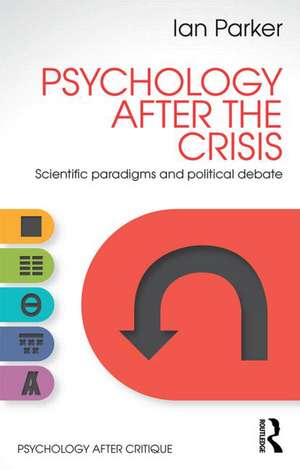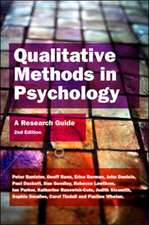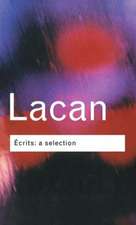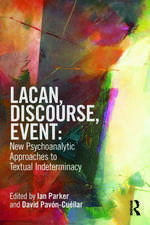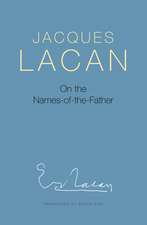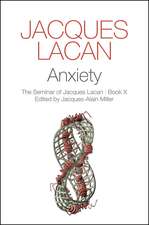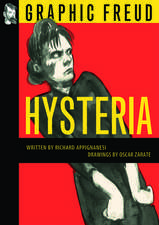Psychology After the Crisis: Scientific paradigms and political debate: Psychology After Critique
Autor Ian Parkeren Limba Engleză Paperback – 19 iun 2014
Psychology After the Crisis is the first volume in the series and addresses three important questions:
- What was the crisis in psychology and why does it continue now?
- How did debates regarding the traditional ‘laboratory experiment’ paradigm in psychology set the scene for discourse analysis?
- Why are these paradigm debates now crucial for understanding contemporary critical psychology?
Psychology After the Crisis is essential reading for students and researchers in psychology, sociology, social anthropology and cultural studies, and for discourse analysts of different traditions. It will also introduce key ideas and debates in critical psychology for undergraduates and postgraduate students across the social sciences.
| Toate formatele și edițiile | Preț | Express |
|---|---|---|
| Paperback (1) | 344.36 lei 6-8 săpt. | |
| Taylor & Francis – 19 iun 2014 | 344.36 lei 6-8 săpt. | |
| Hardback (1) | 994.60 lei 6-8 săpt. | |
| Taylor & Francis – 19 iun 2014 | 994.60 lei 6-8 săpt. |
Preț: 344.36 lei
Nou
Puncte Express: 517
Preț estimativ în valută:
65.89€ • 68.97$ • 54.84£
65.89€ • 68.97$ • 54.84£
Carte tipărită la comandă
Livrare economică 31 martie-14 aprilie
Preluare comenzi: 021 569.72.76
Specificații
ISBN-13: 9781848722071
ISBN-10: 1848722079
Pagini: 138
Ilustrații: black & white illustrations
Dimensiuni: 138 x 216 x 8 mm
Greutate: 0.17 kg
Ediția:New.
Editura: Taylor & Francis
Colecția Routledge
Seria Psychology After Critique
Locul publicării:Oxford, United Kingdom
ISBN-10: 1848722079
Pagini: 138
Ilustrații: black & white illustrations
Dimensiuni: 138 x 216 x 8 mm
Greutate: 0.17 kg
Ediția:New.
Editura: Taylor & Francis
Colecția Routledge
Seria Psychology After Critique
Locul publicării:Oxford, United Kingdom
Public țintă
Postgraduate and UndergraduateCuprins
Introduction: Psychology after the Crisis 1. Critical Psychology and Critical Practice in Britain 2. Discursive resources in the Discourse Unit 3. Critical Psychology and Revolutionary Marxism 4. Remembering Mao 5. Universities are Not a Good Place for Psychotherapy and Counselling Training 6. Global Change: Micro-Climates of Social Development, Adaption and Behaviour 7. ‘This World Demands our Attention’
Notă biografică
Ian Parker was Co-Founder and is Co-Director (with Erica Burman) of the Discourse Unit. He is a member of the Asylum: Magazine for Democratic Psychiatry collective, and a practising psychoanalyst in Manchester. His research and writing intersects with psychoanalysis and critical theory. He is currently editing a book series Lines of the Symbolic (on Lacanian psychoanalysis in different cultural contexts) for Karnac Books. He edited the 2011 four-volume Routledge major work Critical Psychology, and is editing the series Concepts for Critical Psychology: Disciplinary Boundaries Re-Thought. His books on critical perspectives in psychology began with The Crisis in Modern Social Psychology, and How to End It (Routledge, 1989), and continued with Discourse Dynamics: Critical Analysis for Social and Individual Psychology (Routledge, 1992). His recent books include Qualitative Psychology: Introducing Radical Research (Open University Press, 2005) and Revolution in Psychology: Alienation to Emancipation (Pluto Press, 2007).
Recenzii
'This series is the comprehensive resource we have been waiting for to enable new generations of budding psychologists, and all those who concern themselves with how we might live, to find their way to a just appreciation of what it might be to understand the myriad ways a human being can be a person among persons.' – Rom Harré, Linacre College, University of Oxford, UK, and the Psychology Department, Georgetown University, USA
‘This volume usefully brings together a diverse range of previously published influential papers from a unique, provocative and inspiring voice in critical psychology. The focus is on critical trends in theory and method following the ‘crisis’ in psychology, with Parker reiterating the value of Marxism, Feminism, Poststructuralism and Psychoanalysis throughout, while also highlighting various risks, traps and limits to apparently critical projects (e.g. discourse analysis). A highly recommended collection from a leading international scholar-activist.' – Brendan Gough, School of Social, Psychological & Communication Sciences, Leeds Metropolitan University, UK
‘Written with both humility and great insight, Professor Ian Parker's book describes how the failed paradigm revolution in mainstream psychology has resulted in a movement called ‘critical psychology’. Parker offers an elegant analysis and critique of the assumptions that ground both mainstream psychology and critical responses to it. This book will appeal to both students new to the field of critical psychology and more seasoned readers—it is accessible, engaging, and a philosophically grounded call to action.’ – Lisa Cosgrove, Edmond J. Safra Center for Ethics, Harvard University, and College of Education and Human Development, University of Massachusetts-Boston, USA
‘This volume usefully brings together a diverse range of previously published influential papers from a unique, provocative and inspiring voice in critical psychology. The focus is on critical trends in theory and method following the ‘crisis’ in psychology, with Parker reiterating the value of Marxism, Feminism, Poststructuralism and Psychoanalysis throughout, while also highlighting various risks, traps and limits to apparently critical projects (e.g. discourse analysis). A highly recommended collection from a leading international scholar-activist.' – Brendan Gough, School of Social, Psychological & Communication Sciences, Leeds Metropolitan University, UK
‘Written with both humility and great insight, Professor Ian Parker's book describes how the failed paradigm revolution in mainstream psychology has resulted in a movement called ‘critical psychology’. Parker offers an elegant analysis and critique of the assumptions that ground both mainstream psychology and critical responses to it. This book will appeal to both students new to the field of critical psychology and more seasoned readers—it is accessible, engaging, and a philosophically grounded call to action.’ – Lisa Cosgrove, Edmond J. Safra Center for Ethics, Harvard University, and College of Education and Human Development, University of Massachusetts-Boston, USA
Descriere
Psychology After the Crisis is the first volume in the Psychology After Critique series. The book reviews the significance of debates over methodological ‘paradigms’ in social psychology, and sets the scene for the emergence of contemporary critical psychology.
